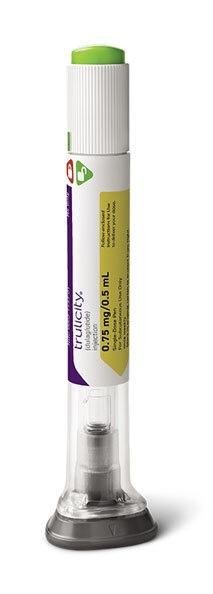Trulicity Dosage
Generic name: Dulaglutide 0.75mg in 0.5mL
Dosage form: injection, solution
Drug class: GLP-1 Agonists (Incretin Mimetics)
Medically reviewed by Drugs.com. Last updated on Jun 13, 2025.
Adult Dosage
- The recommended starting dosage of TRULICITY is 0.75 mg injected subcutaneously once weekly. Follow the dosage escalation below to reduce the risk of gastrointestinal adverse reactions.
- After 4 weeks, the dosage may be increased to 1.5 mg once weekly for additional glycemic control.
- If additional glycemic control is needed, increase the dosage in 1.5 mg increments after at least 4 weeks on the current dosage.
- The maximum recommended dosage is 4.5 mg injected subcutaneously once weekly.
Pediatric Dosage
- The recommended starting dosage of TRULICITY is 0.75 mg injected subcutaneously once weekly.
- If additional glycemic control is needed, increase the dosage to the maximum recommended dosage of 1.5 mg once weekly after at least 4 weeks on the 0.75 mg dosage to reduce the risk of gastrointestinal adverse reactions.
Recommendations Regarding Missed Dose
- If a dose is missed, instruct patients to administer the dose as soon as possible if there are at least 3 days (72 hours) until the next scheduled dose. If less than 3 days remain before the next scheduled dose, skip the missed dose and administer the next dose on the regularly scheduled day. In each case, patients can then resume their regular once weekly dosing schedule.
- The day of weekly administration can be changed, if necessary, as long as the last dose was administered 3 or more days before the new day of administration.
Important Administration Instructions
- Prior to initiation, train patients and caregivers on proper injection technique.
- Administer TRULICITY once weekly, any time of day, with or without food.
- Inject TRULICITY subcutaneously in the abdomen, thigh, or upper arm.
- Rotate injection sites with each dose.
- Inspect TRULICITY visually before use. It should appear clear and colorless. Do not use TRULICITY if particulate matter or coloration is seen.
- When using TRULICITY with insulin, administer as separate injections and never mix. It is acceptable to inject TRULICITY and insulin in the same body region, but the injections should not be adjacent to each other.
Frequently asked questions
- Which GLP-1 drug is best for weight loss?
- Trulicity vs Ozempic: Which is right for you?
- Does Trulicity cause weight loss?
- Trulicity vs Mounjaro: How do they compare?
- Trulicity and diet: What foods should you avoid?
- Does Trulicity need to be refrigerated?
- How do you use/inject Trulicity?
- Can Trulicity be injected cold?
- Can Trulicity be used with insulin?
More about Trulicity (dulaglutide)
- Check interactions
- Compare alternatives
- Pricing & coupons
- Reviews (972)
- Drug images
- Latest FDA alerts (2)
- Side effects
- Patient tips
- During pregnancy
- Support group
- FDA approval history
- Drug class: GLP-1 Agonists (Incretin Mimetics)
- Breastfeeding
- En español
Patient resources
Professional resources
Related treatment guides
See also:
Further information
Always consult your healthcare provider to ensure the information displayed on this page applies to your personal circumstances.


